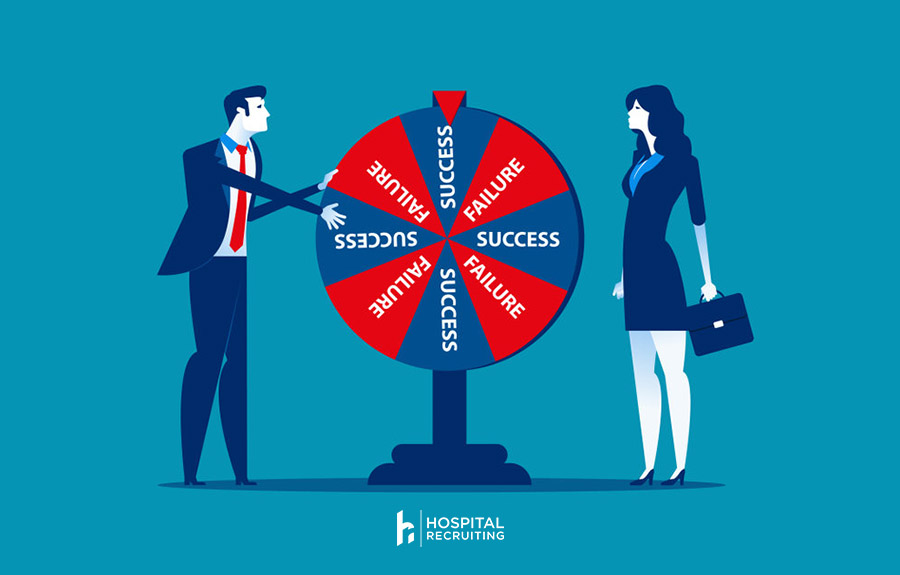
Some recruiters envy their peers – they get the best applicants, score the easiest jobs to fill, and never get ghosted. These colleagues never have candidates say yes to a job and then change their minds. Admins don’t call them, angrily, that the newest hire no-showed for their first day of work; their placements always turn into long-term hires. How do these recruiters get all the luck – and where do you get some of it?
The truth is there’s little ‘luck’ in recruiting; it’s mostly hard work. When you know what you’re doing it may appear seamless, but there’s a lot going on behind the curtain to make sure the ‘luck’ holds.
These are healthcare professionals who have the pulse of the institution, have high levels of emotional intelligence, and have figured out a way to marry both. Understanding the needs of both the facility and potential hires is critical. Leveraging that knowledge to make the best possible referrals and hires isn’t luck; it’s roll-up-your-sleeves hard work.
Where they focus
When you know what your facility is looking for in a candidate, you can hone in on those who bring the mindset you need to the table. Some healthcare recruiters focus on specific areas of expertise: doctors, nurses, admin, facilities. Over time they develop a feel for who is going to be the right fit, and who will not. The higher up the institutional ladder, the more this instinct is needed.
When your facility is community-centric, top recruiters are laser-focused on candidates with a strong commitment to social values. It’s not that they ignore those who are more advancement oriented. It’s that they know they’ll be wasting the candidate’s time and their own for a match that is not made in healthcare heaven.
From the most conservative facility to the most cutting-edge, they know where the institution stands when it comes to new hires. While they may be expanding the facility’s reach into underserved communities, they’re always looking for a match that can result in a long-term, successful hire for the institution and the candidate.
Who they recognize
These are recruitment professionals who leverage their own emotional intelligence to assess potential hires. The CV or resume got them in the door, but who they are as a person, what they hope to achieve professionally, and where your facility fits into the equation are puzzle pieces. The ‘luckiest’ recruiters see where the pieces fit and create a full picture.
There’s a job for everyone, but not everyone is right for every job. Interviewing a great candidate that isn’t going to be happy in the department isn’t worth doing. Working with potential hires that will not achieve their professional goals, in the short- or long-term, wastes everyone’s time. Listening skills and empathy are key to recognizing what the job seeker wants – and if your institution is the right fit for them.
Selling – not hard-selling
If you’ve gotten to the point in the hiring process where you’re overcoming the candidate’s objections, you’ve gone too far with this job seeker. By the time an offer letter is ready to be made, he/she should be anxiously awaiting its delivery, not dreading its receipt.
Candidates who have concerns at the end-stage of the process haven’t been well vetted or well informed by the time they get there. If there were minor objections along the way, they should have been addressed. If there were major objections or concerns, they or the candidate should have been eliminated. The job of the healthcare recruiter is to sell candidates on your facility. If recruiters are resorting to hard-sell tactics, they may be affecting short-term hires, but they’re also contributing to churn.
Putting in the time
What may look like an easy time recruiting to the casual observer is typically the result of a lot of dedicated, behind-the-scenes work. These are professionals poring through resumes instead of skimming. These are professionals happy to take phone calls on evenings and weekends to accommodate someone who can’t talk while on the clock. They put in the time to get the job done and make it look seamless while doing it.
Understanding internal and external clients from both ends of the recruitment process is key. When you know what the institution wants from a new hire and what a new hire wants from an institution, there’s little luck needed. Healthcare recruitment that focuses on client (facility and candidate) needs and expectations creates long-term connections – the ‘luck’ is all hard work.
